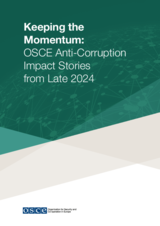
Good economic governance and combating corruption

The OSCE helps its participating States strengthen their good governance framework, assisting them with programmes to combat corruption, money laundering and the financing of terrorism, promoting a whole-of-society approach.
Quick links
Overview
International co-operation to strengthen good governance and combat corruption
Corruption erodes public trust, undermines the rule of law, and diverts resources from vital services such as healthcare, education and infrastructure. This perpetuates inequality, weakens institutions, hampers development, and creates openings for organized crime, instability and unrest.
Good governance is fundamental to economic growth, political stability and security. It is essential for all elements of the OSCE’s comprehensive concept of security, encompassing the politico-military, economic and environmental, and human dimensions. To enhance security and stability, the OSCE fosters international co-operation on economic issues, strengthens governance and supports participating States in fighting corruption, money laundering and the financing of terrorism.
The OSCE works closely with governments, civil society, the private sector and international partners, drawing on its extensive field presence in South-Eastern Europe, Eastern Europe and Central Asia. It promotes a whole-of-society approach, engaging in particular women and youth in governance efforts.

Good Governance
Our work
Our thematic and programmatic tasks
The OSCE helps participating States strengthen governance and combat corruption and money laundering, as well as enhance transparency and the rule of law. The Office of the Co-ordinator supports these efforts through:
- promoting the ratification and implementation of the UN Convention against Corruption, the Financial Action Task Force (FATF) Recommendations, and the Organisation for Economic Co-operation and Development (OECD) Istanbul Anti-Corruption Action Plan;
- improving national legislative and regulatory frameworks on anti-corruption, anti-money laundering, and counter-terrorism financing;
- supporting national risk assessments to identify and mitigate money-laundering and terrorism-financing threats;
- strengthening asset recovery and financial investigation capacities and facilitating international co-operation;
- mitigating risks linked to virtual assets and cryptocurrencies;
- delivering capacity-building, training and advisory support for governments, civil society, the private sector and youth;
- enhancing information-sharing mechanisms and developing practical tools, guidance and policy recommendations; and
- promoting youth resilience against corruption through education and awareness initiatives.
Through advisory missions, tailor-made training courses, dialogue platforms and knowledge-sharing, the OSCE helps participating States prevent corruption, recover assets and build effective, transparent institutions that foster long-term stability and security.
Featured
Activities, news and other highlights

OSCE launches report on role of financial literacy in youth crime prevention

Enhancing youth crime and drug use prevention through education on legality and awareness campaigns addressing threats of organized crime and corruption

Supporting Anti-Corruption Efforts of the Government of Moldova
News and activities
Current announcements, press releases, media advisories and other updates
Projects
Initiatives funded by individual states and organizations
Studies and reports
Reports, studies and analyses for policymakers, researchers and all those interested in this field of our work




